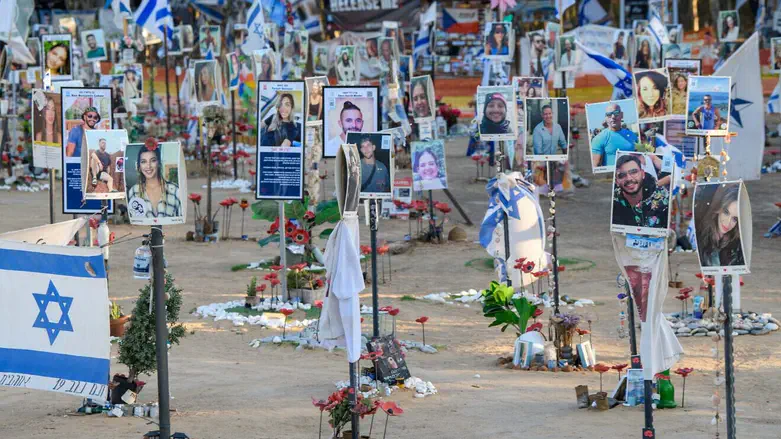
* Note: Indented, bold text is direct quotes from Song of Songs. Text in square brackets is Rashi’s interpretation.
Chapter 8 of Song of Songs by King Solomon (along with the interpretations of Rashi), is poetic liturgy describing for us the period of the end of days, as we approach the Redemption. Here we find Israel represented by a little sister, who is young and immature, and whose allegiance and actions will determine her fate.
We have a [little] sister...
[She is little and humbles herself more than all the nations...]
What shall we do for our sister on the day she is spoken for?
[When the nations whisper about her to destroy her…]
In our day and time, we can see how Israel represents both tremendous power and military and moral might, as well as its antithesis, vulnerability and frailty. The Song of Songs explains the dichotomy to us, as the little sister derives her strength from her attachment to G-d and her allegiance to His commandments, which then gird her with a protective shield.
Sadly, nowadays, we can clearly see how the modern state of Israel has turned away from its moral construct, in order to embrace the very deeds that will destabilize it. Rashi explains to us that the little sister’s faith, when dealing with the nations, is measured by her ability to withhold from intermarriage, intermingling, and seduction.
If she be a wall,
[Strong in her faith and in her fear of God, to be against them like a copper wall, that they should not enter her midst, meaning that she will not intermarry with them, and they will not intermingle with her, and she will not be seduced by them.]
We will build upon it a fortress of silver;
If she be a door,
[Which turns on its hinges, and opens whenever someone knocks on it, she, too, if she opens for them so that they enter her and she them.]
We will panel it in cedar.
[Wooden panels which rot and which the worm gnaws and eats.]
On October 7th, the Nova festival seemed the ultimate integration of foreign ideology, when on one of the holiest days of the year, both Simchat Torah and Shabbat, hundreds of young Israeli Jews chose to dismiss the religious significance of the day in order to dance to foreign music in the presence of the idolatrous figure of the Buddha. Then, tragically, these young souls found themselves at the mercy of our murderous enemies.
Rashi had warned us of the nation of Israel opting to be like a wooden door allowing the nations to enter the nation and the nation into them, and ultimately being left to rot.
Look at the kibbutzim, where, in an interview one month after the release of one batch of hostages, the person telling his story said that he wanted to wish his neighbors a “Merry Christmas,” but couldn’t bring himself to do so. The doorway to the kibbutzim of the Gaza envelope was open to them so that they enter Israel and Israel into them.
Some of the abductees worked for organizations that demonized Israel in order to portray their neighbors across the border as decent. One of these said when being abducted “I have friends in Gaza.” Another elderly person who had made it her life’s purpose to transport children from Gaza into Israel’s hospitals for medical care, was cruelly murdered with no regard to the acts of kindness she had performed.
Foreign ideology has seeped in like a poison into Israeli society, making it deny its fundamental identity and obligations. As it is, missionaries are causing havoc in Israel, taking advantage of the ignorance and frailty of a deeply traumatized populace in order to ensnare them into a way of thinking that guarantees their destruction. Intermarriage, likewise, has risen sharply, so that the average Jew now often chooses as a life partner someone who has no identification whatsoever with the holy mission decreed upon Jews.
How will we overcome these challenges and this turmoil?
I am a wall,
My breasts are like towers.
[Synagogues and places of learning, which nurture Israel with words of Torah.]
So I became in his eyes
As one who finds favor.
At the time when our holy texts tell us that our empowerment comes through our towers, that is our synagogues and our places of learning, the State of Israel has been riddled with strife in these two areas.
On Yom Kippur 2023, just before October 7, protestors thought it their right to tear apart public partitions of prayer that had been set up in Tel Aviv because they deemed them unsuitable to their way of thinking. Likewise, the Supreme Court of Israel ruled that yeshiva learning must be suspended for men of military age without qualifying it. These places of studies, as well as those who attend them, were to be threatened and penalized in various ways.
The Knesset and IDF are finally attempting to find a balance.
While there are many who feel strongly that all able bodied men must serve in Israel at a time of war, especially the current existential war, there is a need for provisions to replace or complement the loss to the learning that involves. Torah learning must be seen as an occupation that must be maintained to guarantee Israel's survival.
And now, so said the Lord, your Creator, O Jacob, and the One Who formed you, O Israel, Do not fear, for I have redeemed you, and I called by your name, you are Mine. When you pass through water, I am with you, and in rivers, they shall not overflow you; when you go amidst fire, you shall not be burnt, neither shall a flame burn amongst you.
(Isaiah 43:1-2)
May we be worthy of God’s protection!